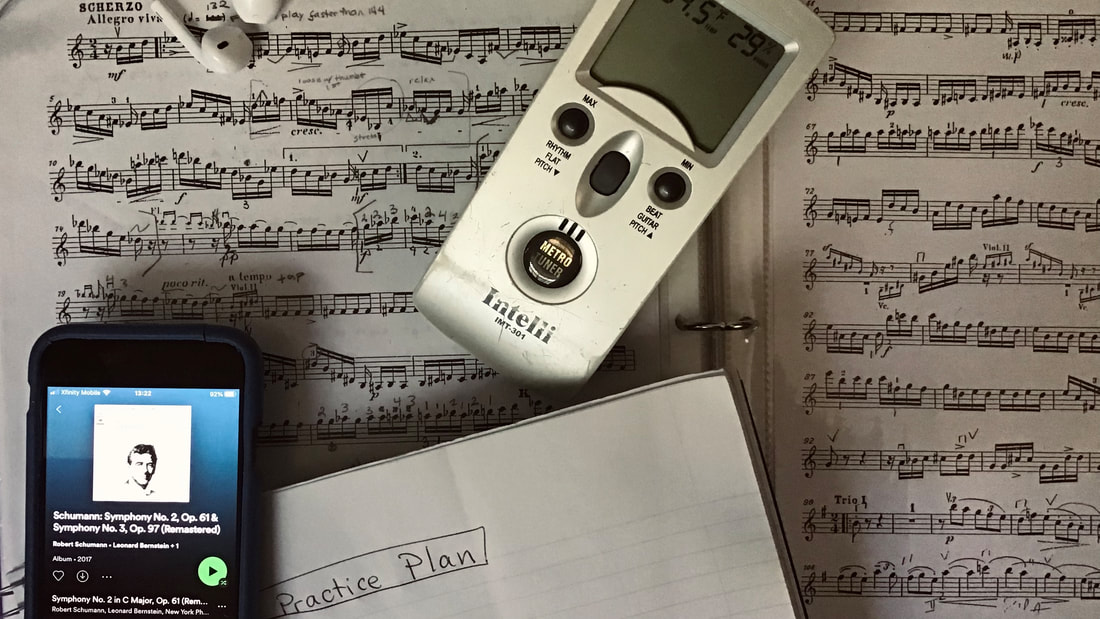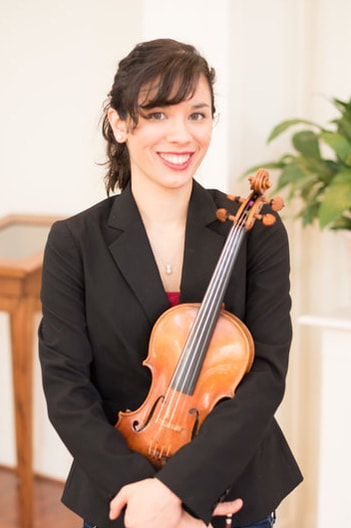For many, the sight of audition excerpts, with all those tricky notes, makes the heart jump and the stomach clench. The panic can throw you into mindless repetition, with the physical and mental struggles increasing steadily as the stress builds toward audition day.
However, a calmer and more measured approach will likely yield better preparation, both in terms of playing and mental state. Consider the following audition preparation approaches and perspectives before you continue (or start) your preparations:
1. Excerpts are music.
Consider the bigger musical picture: the composer didn’t write this excerpt to make your life miserable and to set you up for harsh judgements from other people. The composer wrote a piece of music - and for more instruments than the first violins! The first step in audition preparation is to gather recordings of the *entire* piece from which the excerpt is taken. Then, make yourself a playlist and listen to it constantly through your audition preparation. Find the moment in the track where your excerpt starts, and write it down on the sheet music, so you can skip straight to it for some deliberate active listening when first learning the excerpt.
2. Practice how you want to feel in the audition room.
You are practicing your mindset every time you practice. If you’re feeling stressed, frustrated, and tense every time you practice your audition music, then you are practicing feeling stressed, frustrated, and tense. Choose practice strategies that allow you to play with confidence. Use calming strategies such as deep breathing, focusing on releasing muscles, and saying affirmations. In other words, practice feeling how you want to feel when playing music. If you catch yourself in a negative thought spiral or feeling upset, put the instrument down. Give yourself a break, take care of your mental health, and come back to practice when you can approach the music from a calmer perspective. You can choose how you think and how you feel. Simply saying "How would I feel if I felt calm? How would it feel if I felt confident with every note?" and then feeling that way in your head and your body can make a huge difference.
3. Practice skills, not just the notes.
Often, especially with intermediate students, an audition may require a difficult technique that the student hasn’t yet mastered (see my other blog on what to consider when choosing an audition…). The instinct may be to just play that tough part over and over again. Instead, isolate the skill. Identify all the skills needed to play each excerpt. Is it doing spiccato on string crossings? Playing in an unfamiliar high position? Reading ledger lines? Shifting? Whatever the skill is, work with your teacher to design a practice routine that has you developing that skill in multiple contexts. Start with the physical motions needed to do each technique, starting with simple exercises and eventually including etudes and scales. This may feel like you are wasting time by not playing the excerpt itself. But you will be pleasantly surprised at how much more comfortable the excerpts can feel over time if you truly build the skill and thoroughly understand how to do it - not just play "that hard part" over and over again.
If an audition requires multiple complex skills that are not yet developed, consider taking a pass on this audition. The wrong audition at the wrong time, especially in the case of a young student, can cause regression, not progression, of the student’s skills. It can also potentially lead to performance injury, and it can cause a severe reduction in the student’s confidence and love for music.
4. Stay slower, longer.
Multiple conductors and adjudicators have told me through the years that they would rather hear an excerpt played cleanly, under tempo, than something sloppy and struggling at full tempo. So, even though you may hear a very fast recording, or see a high metronome marking on the excerpt, play at the tempo that you can play with full awareness of your body while listening to yourself, and put in as many layers of musical detail as you can. Leave nothing to chance - practice with a metronome on a daily basis and be in charge of your tempo. Avoid blindly playing whatever tempo happens to come out of your fingers and bow on any given day.
Wait to increase tempo until you are confident and can play fluently at your current tempo. This might look like staying at half tempo for a couple weeks, then staying at three-quarters tempo for a few more weeks. Depending on what "full" tempo is, you may need a couple weeks to a month to build up to it. Also consider: have you ever played that fast before? Can you play that fast without tensing?
And, if it comes down to it, opt to play under tempo in the audition rather than too fast. Being able to maintain a steady, controlled tempo will help you stand out in an audition!
5. Practice auditioning.
Playing the violin is one thing. Taking an audition is another. Learning the notes is only half the battle. The skill of staying present and focused in an audition is exactly that: a skill. If you only practice alone in your room, you won’t be ready when it comes time to audition.
Find out as much information as you can about the audition format - online or in-person? Recorded or live? Screen or no screen? Then, once you can play the audition material (even at a slow tempo), do mock auditions for yourself. Practice waiting in the hallway, walking into a room, putting your music on the stand, getting into playing position, and playing the first note. You can also use visualization to practice this. Sit and imagine yourself going through the entire audition process, from arrival at the audition site to walking into the audition room and playing each element.
Practice starting right away when you put the instrument into playing position. Often students make several sounds as they try to find the starting note, or they half-heartedly start the excerpt and then restart with a stronger sound. You don’t have the luxury of this time in the audition room. Train yourself to find your playing stance confidently, find the first note with the most efficient movements possible, and play right away.
The video camera is your best friend during this audition preparation process. Record your mock auditions. Not only will the footage give you important information about the accuracy of your playing, you will also be able to observe how your body reacts when you are nervous - look for tensed muscles, locked knees, shallow breathing, any old habits that return in your technique. The more aware you are, the more you will be able to connect to your body in the moment and make any adjustments you need.
Some final thoughts:
You have control over three things: your preparation, how you play, and how you process the result. You have no control over how everyone else auditioning plays, how other people behave on audition day or the final result. Audition day is exactly that - one day. The judges make quick decisions based on a snapshot of each candidate’s playing. It is by no means a complete or holistic picture. I’ve been accepted based on auditions that I felt were my worst playing and rejected based on auditions that I thought were my best. It’s all relative to how many people audition and how they play in the room. Any time spent speculating about the results is time taken away from caring for ourselves and growing as musicians.
Immediately after the audition (perhaps even before the results are posted), plan something to celebrate your effort and the end of the preparation process. Get your favorite food for dinner, treat yourself to a new book or movie over the weekend, or even take a day off of practicing and do something relaxing and restorative for yourself.
This perspective is important for parents and teachers, too - both during and after the audition process. Acknowledge and praise your child, your student or yourself for the time, the preparation, and the effort exhibited. Emphasize this over the result, whether the result is positive or negative. This will help your child or student have a perspective on the experience beyond "Accepted/Rejected." It’s important to affirm the effort, to frame the audition as only one part of a longer musical journey. Let your child, student or yourself know: you are valued, seen, and loved exactly as you are, just for being yourself - not connected to any audition result. This attitude will make you or your student more able to "win" an audition with grace and perspective, and more resilient in the face of a negative result, to try again another day.


 RSS Feed
RSS Feed